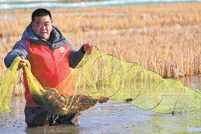FAMILY DIFFERENCES ARISE IN CARING FOR GRANDCHILDREN
After migrating to help with child-raising, older generation learning to adjust to new surroundings

He Chuanqiong and her husband start the day by feeding and dressing their 4-month-old granddaughter at around 6 am before preparing breakfast for the family.
Hailing from Hubei province, He, 57, traveled to Beijing with her husband in December for their granddaughter's birth the following month.
The couple farm about 1 hectare of land in their hometown of Jingmen city, but to look after their 30-year-old daughter and their granddaughter, they have temporarily stopped work.
He wanted to come to Beijing earlier, but her daughter declined this suggestion, as she was out at work and feared her parents would be bored at home.
In China, it is tradition for the older generation to help with the care of grandchildren. In the past, older parents cared for their grandchildren in their hometown, but with many young people finding work in big cities, their parents now have to travel to these destinations.
Those such as He who leave their hometown to take care of their grandchildren in big cities are known as laopiao.
Although the older generation can effectively cope with child-rearing after bringing up their own children, there is a risk of friction and conflict among family members, and of other problems arising.
He's daughter hired a babysitter to look after the child during the first month. However, due to different concepts about childrearing, arguments arose between He and the babysitter.
At the time, it was snowing in Beijing and the heating was on, but He thought the baby would be cold, as the babysitter insisted on the child wearing only one piece of clothing. The babysitter also cooked food many times a day, much of which was wasted, which also left He angry.
"We've lived frugally for a long time, so we can't stand that kind of waste, but to avoid upsetting our daughter, we didn't complain," He said. "After all, she hired the babysitter, so we went out for a walk after mealtimes every day. It was a case of out of sight, out of mind."
He has adapted to her daughter's living habits, but her husband is indifferent to staying in Beijing. As he frequently leaves clothes and shoes untidily and does not clean up garbage promptly, He often reminds him to be more considerate.
When the couple decided to travel to Beijing, many of their neighbors questioned the decision. They thought that as the daughter was married, it was the duty of their son-in-law's parents to take care of the baby.
"Some neighbors even asked me jokingly how long I would stay in Beijing before being sent back home. I just smiled and didn't answer them, as I simply wanted to help my daughter," He said.
Initially, her son-in-law was also at home, but He and her husband didn't get along very well with him, which they said was due to living different lifestyles.
"My son-in-law was often sullen and unhappy at mealtimes, when he didn't say anything to us. At one point, I couldn't take this anymore and asked my daughter what was going on, but she said she didn't know," He said.
"Although life in Beijing is good, I prefer to live in my hometown. Taking care of a newborn every day is also tiring, and apart from my husband and daughter, I have nobody to chat to. I just wanted to lighten my daughter's burden."
More difficulties
Chen Shutang, 62, from Lu'an, Anhui province, and his wife also encountered problems due to different living habits while taking care of their grandson in Beijing in late 2020. It was Chen's first time in the Chinese capital.
After arriving in the city, his son and daughter-in-law told Chen, a longtime smoker, several times not-to smoke before and while he took care of the baby. He dismissed their request at first, before his daughter-in-law became extremely angry and argued with Chen's son over the smoking issue.
Chen said: "Secondhand smoke is said to be harmful to children and others, but I don't fully understand this, because in my hometown no one cares about it.
"Although my daughter-in-law may be right, her attitude toward the problem angered me. As a smoker for many years, I can't just quit the habit immediately. I also paid a great deal of attention to many problems, including smoking, after living with my son and daughter-in-law. Every time after I smoked, I stayed outside for a long time."
Chen and his wife used to work at a machinery factory in Lu'an. Due to hypertension, problems with his shoulder, and the imminent birth of his grandson, Chen turned down an offer of re-employment after he retired in 2020.
He said it is only natural for grandparents to take care of their grandchildren. Although some unpleasant family incidents occurred while he was in Beijing, Chen still feels extremely happy about the past year.
However, his medical treatment and travel in the capital caused him problems. Requiring regular checkups and medication, Chen didn't know how to use his healthcare insurance to cover the cost.
"In my hometown, seeing a doctor is almost free of charge, as the insurance covers most of the cost, but living in Beijing for the past year, I spent a lot of money on seeing a doctor for my medical problems," he said.
Chen added that visiting a doctor in Beijing is also inconvenient, as apart from having to make an appointment online, using the subway to go to the hospital is also not that easy for him, as he cannot remember the right route to take.
"We also had to scan health codes to get into the hospital and take the subway during the epidemic, which made life very difficult for us," he said.
"My wife often tells me that my son and daughter-in-law are very busy with work and that we should try our best to solve our problems and not cause trouble for them. I agree, but we often encounter problems that are beyond our control. As we have no friends in Beijing to help us, we have to ask my son or daughter-in-law for assistance."
Chen envies his former colleagues who take care of their grandchildren in their hometown and spend time with their families and friends.
"However, my wife and I are getting older. I only have one son and have to rely on him. I won't ask him to give up his life in Beijing after he fought hard for years to find work and settle in the city. We will stay in Beijing and help him bring up our grandson, before returning to my hometown for a short rest at some point in the future," he said.



Today's Top News
- China to apply lower import tariff rates to unleash market potential
- China proves to be active and reliable mediator
- Three-party talks help to restore peace
- Huangyan coral reefs healthy, says report
- PLA conducts major drill near Taiwan
- Washington should realize its interference in Taiwan question is a recipe it won't want to eat: China Daily editorial






























